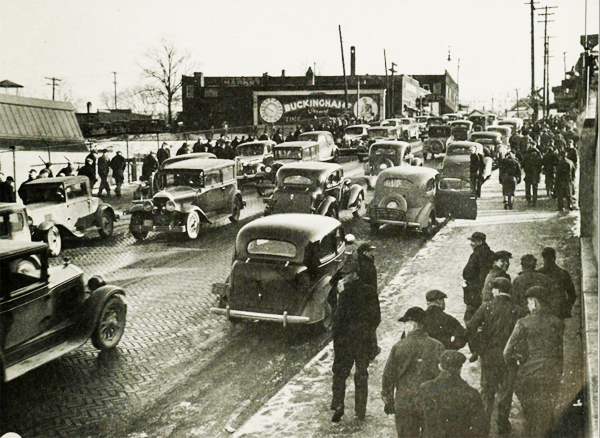UM-Flint Political Science Department Presents "State of the UAW" Panel Discussion

"State of the UAW: Company Union or Vanguard of Social & Economic Justice?" is a panel discussion that will be held Sunday, October 28, at 2 p.m. in the University Center's KIVA Auditorium.
"I hope this event presents a perspective that critically examines some recent UAW strategies—especially those that place it in a position where it cooperates with GM," said Jason Kosnoski, Ph.D., professor and chair of the Political Science Department. "Many workers have challenged this perspective and want the union to act in a more militant, confrontational manner. They are angry with the many concessions the UAW has given over the years, and hope to gain back much of what they have lost."
Panel members include:
Thomas F. Adams, Ph.D.
– Retired autoworker
– Ph.D. in History, Michigan State University
Adams will discuss aspects of the book he is writing based on his dissertation entitled, UAW Incorporated: The Triumph of Capital, as well as his 30 years of experience working at Buick manufacturing in Flint.
Gregg Shotwell
– Retired autoworker
– Recently published book: Autoworkers Under the Gun
Shotwell shares experiences as a worker at GM and Delphi, union activist, and writer.
Scott Shingledecker
– Current GM autoworker
– Team Leader at Flint Truck and Bus
Shingledecker will discuss life as a "GM Gypsy," and what it is like to work in an auto plant today.
Kosnoski contends that unions have become controversial because there has been a concerted effort to destroy unions by corporations and their political allies. In the public sphere and in the political arena, wealthy individuals, and the politicians and think-tanks they sponsor, have been attempting to reverse the gains that workers have made since the New Deal.
"In light of this assault, many unions have had to concede wages, benefits, and work place protection," noted Kosnoski. "From their perspective, they had to do this to survive and continue representing their members. While this is understandable, many workers feel that union leadership, including that of the UAW, has given too much and needs to actively fight this corporate assault."
Kosnoski points out that American unions have more legal and political constraints than unions in other industrialized countries. For example, U.S. corporations face few sanctions for firing workers for union activities, where as in other countries (Germany, Britain, France, Canada) such actions would bring stiff penalties. Many scholars contend that the U.S. has the most corporate-friendly and union-adverse labor laws in the industrialized world.
This panel discussion is the first in a series on the topic of "Worlds of Work and Labor," sponsored by the International & Global Studies Program at UM-Flint. Events focusing on labor and work issues in other countries will be announced soon for the winter semester.
Related Posts
No related photos.
UM-Flint News
The Office of Marketing & Communications can be reached at mac-flint@umich.edu.